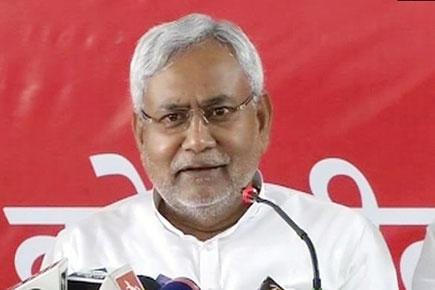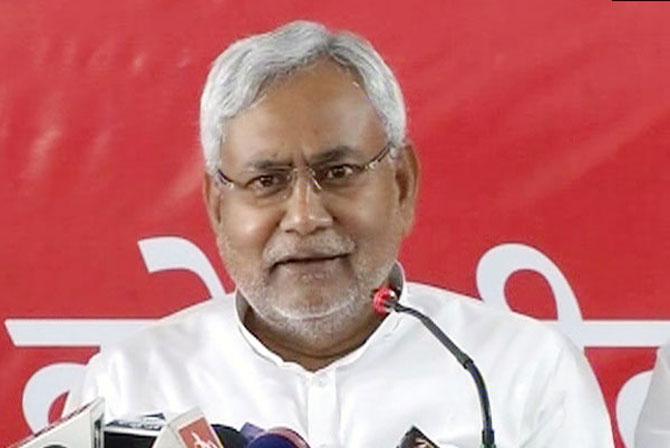The Grand Alliance led by Bihar Chief Minister Nitish Kumar is tipped to win a simple majority in the assembly polls starting on Monday, a pre-election survey said on Thursday

New Delhi: The Grand Alliance led by Bihar Chief Minister Nitish Kumar is tipped to win a simple majority in the assembly polls starting on Monday, a pre-election survey said on Thursday.
ADVERTISEMENT
Another survey warned of a hung assembly, with the Bharatiya Janata Party (BJP)-led NDA securing 119 seats, to the Grand Alliance's 116 in the 243-member assembly. The half-way mark in the house is 122 seats.
A CNN IBN/IBN7-Axis survey said the Grand Alliance of the Janata Dal-United (JD-U), the Rashtriya Janata Dal (RJD) and the Congress was expected to win 137 seats. The BJP-led coalition was poised to win 95 seats, garnering a 38 percent vote share. The Grand Alliance was tipped to get 46 percent vote share.

Nitish Kumar. Pic/ANI
The NDA's main constituent, the BJP, was projected to win 82 seats. Its ally the LJP of Ram Vilas Paswan may get only two seats. Former chief minister Jitan Ram Manjhi's HAM is expected to bag eight seats and the RLSP of Upendra Kushwaha three seats. The JD-U led by Nitish Kumar was expected to win 69 seats, followed by Lalu Prasad's RJD (48 seats) and the Congress (20 seats).
The survey, conducted between September 3 and October 4, involved over 24,000 respondents and covered all the 38 districts and 243 constituencies of Bihar. Fifty percent of the respondents were in the 18-35 age group, 32 percent in the 36-50 age group and the remaining fell in the 50-plus age group.
In a paradox of sorts, 33 percent of Yadavs and 28 percent of Muslims seemed to be deserting the RJD and the JD-U in favour of the NDA or others. At the same time, the Grand Alliance was likely to get more votes from the youth (18-35 age group) than the NDA alliance. Just over 40 percent feel Nitish Kumar will benefit electorally because of the alliance with Lalu Prasad.
Development would be the main election issue. Other issues are inflation and "bijli-paani-sadak", ranking second with 13 percent each. As many as 45 percent of the respondents felt the Nitish government had performed as per expectations while 17 percent said it exceeded their expectations.
With reference to areas of failure, 45 percent said there was no control over corruption during Nitish Kumar's rule. Nitish Kumar's development model got a thumbs-up from 52 percent of the respondents. In contrast, the development model of Prime Minister Narendra Modi in the central government got 48 percent support.
The India TV-CVoter pre-poll survey said the BJP-led NDA could win 119 seats, three short of the magic mark of 122 in the Bihar assembly, and the Grand Alliance 116. Eight seats may go to 'Others'. The NDA has been projected to get 43 percent vote share, compared to 41 percent for the Grand Alliance.
The C-Voter survey covered 9,916 interviews covering all 243 segments. In 2010, the then BJP-JD-U alliance won 206 seats, while the RJD-led alliance with Ram Vilas Paswan got only 25 seats. In the 2014 Lok Sabha battle, the NDA won in 174 assembly segments.
Asked which was the biggest issue for the voters, 17.9 percent said unemployment, 12.7 percent said power cuts, while 25 percent respondents said "can't say". Asked which party can solve these problems better, 44.7 percent opted for the NDA while 38.6 percent favoured the RJD-JD-U-Congress alliance.
In the caste-wise social groupings, 44 percent Dalits, 41 percent Mahadalits, 50 percent MBC (most backward castes), 29 percent OBC and a whopping 70 percent upper castes favoured the NDA. Another 28 percent Dalits, 33 percent Mahadalits, 31 percent MBC, a whopping 59 percent OBC and 15 percent upper caste respondents favoured the Grand Alliance.
 Subscribe today by clicking the link and stay updated with the latest news!" Click here!
Subscribe today by clicking the link and stay updated with the latest news!" Click here!






